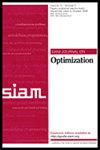随机子空间中的随机信任区域算法及收敛性和预期复杂性分析
IF 2.3
1区 数学
Q1 MATHEMATICS, APPLIED
引用次数: 0
摘要
SIAM 优化期刊》,第 34 卷第 3 期,第 2671-2699 页,2024 年 9 月。 摘要本文通过引入基于随机子空间迭代最小化的信任区域方法 STARS,提出了一种大规模随机无导数优化(DFO)框架。该框架是随机子空间无导数优化(RSDFO)框架和随机模型随机优化算法(STORM)在算法和理论上的扩展。此外,与 RSDFO 一样,STARS 通过最小化在低维仿射子空间中逼近目标的插值模型来实现可扩展性,从而显著降低了函数求值的每次迭代成本,并在大规模随机无导数优化问题上取得了优异的性能。用户确定的这些子空间的维度(例如由所谓的约翰逊-林登斯特劳斯变换的列定义的子空间)与问题的维度无关。受 RSDFO 和 STORM 分析的启发,为了达到收敛的目的,要求子空间的特定质量以及随机函数估计值和模型的精确度以足够高但固定的概率保持不变。在后一种假设条件下使用马丁格尔理论,证明了 STARS 几乎肯定会全局收敛到一阶静止点,并证明了达到所需一阶精度所需的预期迭代次数与 STORM 和其他随机 DFO 算法相似,直至常数。本文章由计算机程序翻译,如有差异,请以英文原文为准。
Stochastic Trust-Region Algorithm in Random Subspaces with Convergence and Expected Complexity Analyses
SIAM Journal on Optimization, Volume 34, Issue 3, Page 2671-2699, September 2024.
Abstract. This work proposes a framework for large-scale stochastic derivative-free optimization (DFO) by introducing STARS, a trust-region method based on iterative minimization in random subspaces. This framework is both an algorithmic and theoretical extension of a random subspace derivative-free optimization (RSDFO) framework, and an algorithm for stochastic optimization with random models (STORM). Moreover, like RSDFO, STARS achieves scalability by minimizing interpolation models that approximate the objective in low-dimensional affine subspaces, thus significantly reducing per-iteration costs in terms of function evaluations and yielding strong performance on large-scale stochastic DFO problems. The user-determined dimension of these subspaces, when the latter are defined, for example, by the columns of so-called Johnson–Lindenstrauss transforms, turns out to be independent of the dimension of the problem. For convergence purposes, inspired by the analyses of RSDFO and STORM, both a particular quality of the subspace and the accuracies of random function estimates and models are required to hold with sufficiently high, but fixed, probabilities. Using martingale theory under the latter assumptions, an almost sure global convergence of STARS to a first-order stationary point is shown, and the expected number of iterations required to reach a desired first-order accuracy is proved to be similar to that of STORM and other stochastic DFO algorithms, up to constants.
Abstract. This work proposes a framework for large-scale stochastic derivative-free optimization (DFO) by introducing STARS, a trust-region method based on iterative minimization in random subspaces. This framework is both an algorithmic and theoretical extension of a random subspace derivative-free optimization (RSDFO) framework, and an algorithm for stochastic optimization with random models (STORM). Moreover, like RSDFO, STARS achieves scalability by minimizing interpolation models that approximate the objective in low-dimensional affine subspaces, thus significantly reducing per-iteration costs in terms of function evaluations and yielding strong performance on large-scale stochastic DFO problems. The user-determined dimension of these subspaces, when the latter are defined, for example, by the columns of so-called Johnson–Lindenstrauss transforms, turns out to be independent of the dimension of the problem. For convergence purposes, inspired by the analyses of RSDFO and STORM, both a particular quality of the subspace and the accuracies of random function estimates and models are required to hold with sufficiently high, but fixed, probabilities. Using martingale theory under the latter assumptions, an almost sure global convergence of STARS to a first-order stationary point is shown, and the expected number of iterations required to reach a desired first-order accuracy is proved to be similar to that of STORM and other stochastic DFO algorithms, up to constants.
求助全文
通过发布文献求助,成功后即可免费获取论文全文。
去求助
来源期刊

SIAM Journal on Optimization
数学-应用数学
CiteScore
5.30
自引率
9.70%
发文量
101
审稿时长
6-12 weeks
期刊介绍:
The SIAM Journal on Optimization contains research articles on the theory and practice of optimization. The areas addressed include linear and quadratic programming, convex programming, nonlinear programming, complementarity problems, stochastic optimization, combinatorial optimization, integer programming, and convex, nonsmooth and variational analysis. Contributions may emphasize optimization theory, algorithms, software, computational practice, applications, or the links between these subjects.
 求助内容:
求助内容: 应助结果提醒方式:
应助结果提醒方式:


